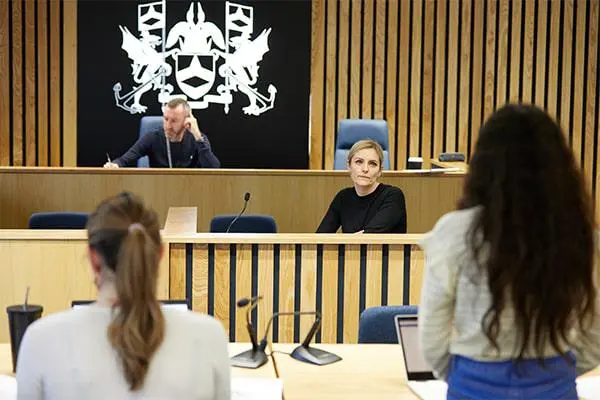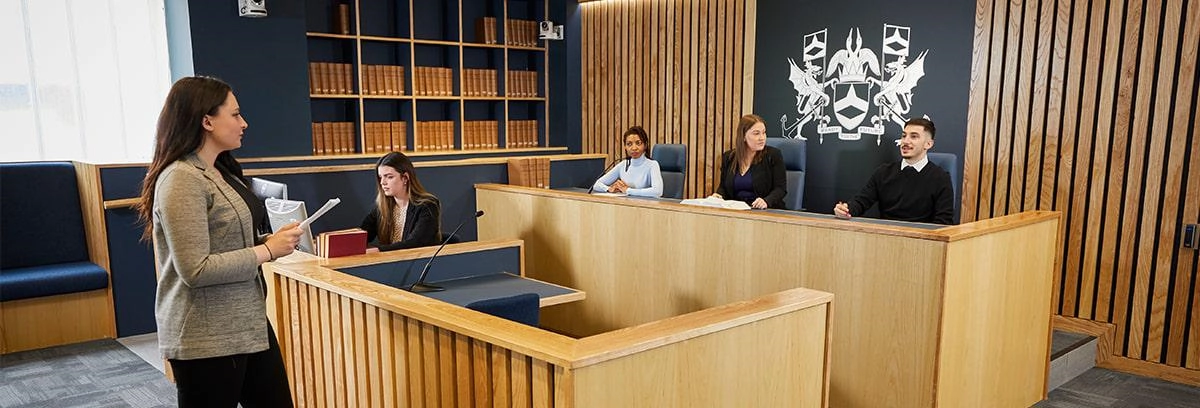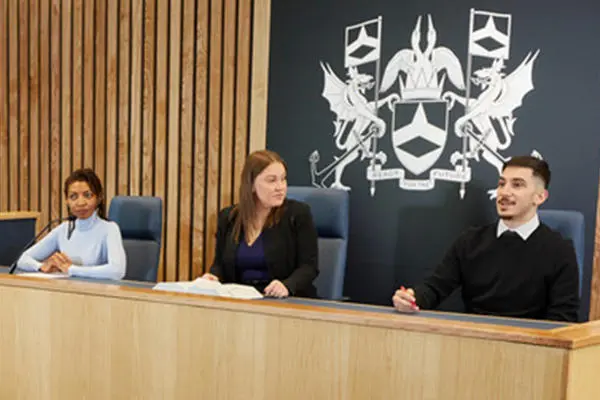
LLM Professional Legal Practice
Embark on your journey to becoming a solicitor with full SQE 1 and 2 preparation.
Find out more
Expand your career horizons across law, criminology, and criminal justice and gain the essential skills for working in the legal practice and criminal justice systems.
Contact international admissions
Email: Call:Solent University’s LLB, delivered through the Solent Law School, places a strong emphasis on professional practice, covering the foundation subjects essential for aspiring solicitors or barristers.
Combined with the study of criminology, you will also develop knowledge in areas such as social problems, criminology and criminal justice, by exploring the experience of crime victims, examine media representations of social problems, and discuss the effect of modern communications technology on the processes of law.
Our recent ground-breaking partnership with the College of Legal Practice enables you to undertake modules in your final year that give you credit towards your degree qualification and also in preparing for the Solicitors Qualification Examination One (SQE1), giving you a real head start if you’re considering becoming a solicitor.
Real-world learning and professional networks are at the heart of the course; The Solent Law School is a founding member of Southampton City Law Network and and Solent University have established connections in the criminal justice sector, such as Hampshire Constabulary, the National Probation Service, the National Crime Agency and various international organisations.
This allows us to offer a dynamic programme of events, workshops and guest lectures from a wide range of visiting professionals from various fields. Additionally, students benefit from work experience opportunities, that give you the chance to experience the legal and criminal justice organisations to develop advanced skills and professional practices and explore diverse career paths.
You will have access to specialist facilities, too – including the University’s moot courtroom, which enables you to practice your legal skills in a realistic environment, and our portable crime scene as well as the law library, and an extensive range of law and criminology resources giving you both the theory and practice for a huge range of careers in law, criminology and criminal justice.
If you’re looking to study our law with criminology degree but don’t have the relevant qualifications or experience, the business and law foundation year will help you develop the core skills and knowledge to progress. Find out more about the business and law foundation year.
This course also offers the option of a placement year. A placement year allows you to put what you've learned in your first and second years into practice in the workplace, gaining valuable real-world work experience before you graduate. Our course and placements teams will help you find the perfect industry placement in your chosen field.
Recognised by:

Recognised by:

This degree is ideally suited to students looking to pursue a career as a solicitor or barrister and also if you’re looking for a career path in criminology or a similar professional capacity.
You will develop analytical and research skills that can be transferred to a broad range of careers, not only in criminology-related fields but also within the wider justice sector.
You may not be sure yet which area of law, criminology or a mix of the two will suit you, but many industries are suitable.
Many students focussing on law, go on to train as a solicitor or barrister, while others pursue careers as legal executives, company secretaries or licensed conveyancers, or in areas such as legal and financial compliance, local and central government, the police service, or paralegal work.
You will also be well placed for a huge range of careers in criminology and criminal justice, from probation and policing services to charity and social service work with offenders and young people.
The University cannot guarantee any particular members of staff will teach specific aspects of the course in the future, but will endeavour to ensure the teaching team maintains their balance of experience and qualifications.
Law students have access to the moot court room to practice their courtroom and debating skills in a real-world environment, as well as access to our portable crime scene.
Students also have access to a dedicated law collection and an extensive range of criminology resources, journals and online materials in the Solent Library, plus on- and off-campus access to a broad range of subscriber law databases, including major collections from Westlaw, Lexis Library and i-Law – providing access to law reports, legislative material, and academic journals. Our vibrant campus brings state-of-the-art facilities to enhance your learning and elevate your student experience. Our award-winning teaching building, The Spark is centred around students and offers a stimulating study environment with flexible learning spaces.
Broaden your horizons by adding an international dimension to your CV – essential to achieving success in today’s fast-changing, global environment.
Studying, working or volunteering in another country could be the experience of a lifetime. Enhance your degree by developing important global skills such as knowledge of other countries, language skills, intercultural awareness, adaptability and confidence.
For more information, please email international.mobility@solent.ac.uk.

This module lays the foundations for a law student and the aspiring legal professional. You will learn how to find various sources of law using legal databases and learn how to then take that legal research and use it to effectively advise and problem-solve for a variety of clients in a variety of real world situations.
Criminal law sits at the very heart of the relationship between the individual and the state. It defines the boundaries of personal freedom, sets society’s moral limits, and determines when the power of the state may be used to investigate, prosecute and punish. This module invites you to explore that relationship in depth, combining the study of criminal law with the practical realities of criminal justice in action. Through this module, you'll develop a strong understanding of the principles that govern criminal liability in England and Wales, including the elements of offences, the mental states required for guilt, and the defences that may excuse or justify criminal conduct.
Contract law governs the agreements that shape everyday life and drive modern commerce, from simple consumer transactions to complex business relationships. This module introduces you to the legal principles that underpin contractual obligations in England and Wales and explores how those principles operate in practice within a business-led economy. Through this module, you will develop a clear understanding of how legally binding contracts are formed, structured and enforced.
Explore civil wrongs, investigate the procedures for bringing an action, and discover the interaction of legal, social and economic factors on this exciting mix of common law and statutory law.
This module will give you an introduction to essential learning on cybercrime and security that will ensure you gain the knowledge and skills needed for a role in criminal justice, policing, and the third sector.
Public law is concerned with the exercise of power by the state and the mechanisms by which that power is controlled, challenged and held to account. This module invites you to explore the constitutional foundations of public power in the United Kingdom and to examine how legal principles protect individuals from the misuse of that power. You will engage with the institutions, doctrines and values that shape public decision-making and define the relationship between the state and the individual.
Land law governs some of the most valuable and significant assets people own. This module introduces you to the legal principles and procedures that regulate rights, interests and obligations in land, while developing your ability to apply those principles in real-world conveyancing and property scenarios. You will explore how ownership and interests in land are created, protected and transferred, gaining a detailed understanding of land registration and the conveyancing process.
Please note: Not all optional modules are guaranteed to run each year.
This module provides an analytical understanding of true crime as a cultural, sociological, and digital phenomenon. You will examine and interpret the ethical complexities of representing trauma and the impact of "citizen detective" culture on the criminal justice system.
This module aims to develop an understanding of the key concepts of punishment, resistance and desistance with specific reference to comparative criminal justice responses (Britain, Scandinavia and South-East Asia) to offending and research on desistance from crime following the introduction of the 2012 Transforming Rehabilitation Programme in England and Wales.
Between years two and three of your course, you'll be able to take a year out from studying to work within your chosen industry gaining valuable work experience. The course team and our careers service will help you with finding a placement.
This module offers a comprehensive and practice-focused exploration of the law governing succession, estate management and the administration of wealth after death. It invites you to engage critically with the legal principles underpinning wills, trusts and probate, while developing the professional judgment required to navigate the complex social, financial and ethical issues that arise in testamentary and estate practice.
In this module, you will critically examine, and engage in discussions covering, a range of current controversies surrounding dangerousness, risk, and offences committed by those offenders deemed to be dangerous to the public.
Please note: Not all optional modules are guaranteed to run each year.
This module critically examines the relationship between crime, gender and sexuality within contemporary society and the criminal justice system. You will learn to apply theory and methods to analyse and solve real-world issues in gender and sexuality within criminal justice and related fields.
This module explores the nature and impact of terrorism and other forms of political violence in the modern world, including a critical examination of extremism and radicalisation. You’ll examine how terrorism is defined, why these definitions are often disputed, and what motivates individuals and groups to use violence for political ends.
This module is designed to bring together your academic, professional and personal development as you complete the final stage of your law degree. It provides an opportunity for you to engage in sustained, independent legal work that reflects the realities of legal practice and professional environments, while allowing you to pursue an area aligned with your interests, ambitions and career goals.
The Solicitors Qualification Examination (SQE) is a two-part centralised assessment (known as SQE 1 and SQE 2) that all intending solicitors will need to pass before entering the profession. This module will prepare you for the SQE1 (the knowledge-based part of the assessment) exam. The module is delivered through the College of Legal Practice and its virtual learning environment and quality assured and overseen by Solent Law School.
Contact international admissions
Email: Call:As part of this course, you will study one module at a time, giving you the chance to build a deeper understanding and see the results of your hard work more quickly. With regular assessments and feedback, rather than exams all at once, you’ll also benefit from improved focus, and a more manageable workload.
Learn more about block teaching
The student achievement team are on hand to help you succeed during your studies at Solent. They aim to contact you at key times during your time here with personalised information, advice and guidance, by email or phone.
The disability advice team provides information, advice and guidance for disabled students.
All students can access Succeed@Solent, Solent's online guide to getting better grades. It offers extensive, practical information and advice on topics such as academic writing, research and presentations.
Law affects almost every aspect of everyday life – and few degrees offer such a variety of well-paid career destinations. The law’s omnipresent nature is reflected in the wide variety of areas of legal practice, including rewarding specialist professions such as criminal law (police, criminology and social and probation work) or commercial law (including roles such as company secretaries, accountants, tax consultants and compliance officers).
Solent University is a founding member of the Southampton City Law Network, which promotes the interests of local law students, teachers, lawyers, and other legal professionals.
Through the law network, students have the chance to gain paid and unpaid work experience from local employers such as E3 Consulting and Lawdit Solicitors, and many law firms have Solent LLB alumni as trainee and fully qualified solicitors, company secretaries, trademark attorneys, legal executives, licensed conveyancers and paralegals.
Crime and justice are real, global concerns, and criminology is a key skill within criminal justice and related fields. The industry offers a variety of employment opportunities that are valuable to society, interesting, stimulating, rewarding and professional.
Some staff members attend and speak at the European Criminology Society Conference, National NSPCC Safeguarding Conference, New Jersey Leadership Conference, International Association of Chief Officers, National Catholic Church Diocese Conference and the Mencap South Regional Conference.

Newly qualified solicitors: £28,000 to £68,000+
It is seen as good practice for trainee solicitors a minimum of £23,703 in London and £21,024 in the rest of the country. Starting salaries in large City firms can range from around £68,000 to £100,000. Starting salaries for newly qualified solicitors in private practices elsewhere in the country typically range from around £28,000 to £68,000. You can expect your salary to rise year-on-year as you gain more experience. If you become a partner in a firm, your salary could potentially reach in excess of £100,000. Partner salaries at Magic Circle, (London's five most prestigious law firms), and international law firms can be on average around £400,000.
Starting salary: £21,402
The starting salary for police constables in England, Wales and Northern Ireland is £21,402, rising to £41,130 at the top of the scale - achievable after about seven years. In Scotland starting salaries are slightly higher at £26,737, rising to £41,578 after about ten years' service. The range of salaries for sergeants is £43,965 to £46,227. Inspectors can earn between £52,698 and £57,162 (£56,496 in London), rising to between £58,332 and £60,732 for chief inspectors (£60,654 in London).
Graduate salary: £18,000 to £25,000
A paralegal with some experience (typically around three to five years') can expect a salary in the region of £30,000 to £40,000. Within larger firms it's possible for an experienced paralegal to earn up to £55,000, and in very rare cases up to £70,000.
The stated salaries are published on prospects.ac.uk.
The Solent Careers team is committed to getting students into great careers.
While you are studying, the team can help you with finding work experience or placements, link you with a mentor, check your CV, or offer one-to-one guidance.
We also have graduate job opportunities just for Solent graduates.

6th
UK uni for sustained employment
Longitudinal Educational Outcomes, 2022
Every student at Solent University will also have the option to study an additional Certificate in Practical Artificial Intelligence qualification alongside their course. Free of charge, the course ensures you'll be prepared for a fantastic and varied career after graduation.

Thinking about studying further than an undergraduate degree? Alumni can get 20% off their postgraduate study.

Embark on your journey to becoming a solicitor with full SQE 1 and 2 preparation.
Find out more
Designed for professionals looking to enhance their CV, this specialist master’s offers insight into real-world commercial law alongside the practical expertise to add value in business, management, compliance, legal, tech, HR and other roles...
Find out more
Get to grips with intellectual property law, copyright, and the fundamentals of modern commercial practice on this fascinating, highly career-focused master’s in law – ideal for business and management professionals looking to enhance their CV.
Find out moreThe tuition fees for the 2026/27 academic year are:
For further information, please visit our tuition fees page.
While most course costs are covered by your tuition fees, some essential resources and optional extras may need to be paid for separately. These additional costs are listed below. For advice on budgeting and managing your money, please contact student.funding@solent.ac.uk.
The 2026/27 additional costs are not yet available. For guidance, previous additional costs have been:
Optional costs
Solent University offers a range of bursaries and scholarships that provide financial assistance or waive fees for tuition or accommodation. Each bursary or scholarship has specific eligibility criteria. Check out our bursaries and scholarships pages to find out more.
Cost of living support
At Solent, we understand that the cost of living crisis may be of some concern. To help, we've put together some detailed information to show what support is available and how to make your money go further.
Graduation costs
There is no charge to attend graduation, but you will be required to pay for the rental of your academic gown (approximately £45 per graduate, depending on your award). You may also wish to purchase official photography packages, which range in price from £15 to £200+. Graduation is not compulsory, so if you prefer to have your award sent to you, there is no cost. Extra guest tickets will go on sale after results publication and will be sold on a first-come-first-served basis. The cost per ticket is currently £20. Please note, we do not guarantee there will be any extra tickets available to purchase.
Contact international admissions
Email: Call:Please select an option below:
As a general guide, we look for qualifications that are equivalent to the British high school A-levels.
If you are applying from outside the UK, find information about entry requirements, visas and agents for your country here.
For further information about EU qualifications, please see our course entry requirements document.
As a general guide, we look for qualifications that are equivalent to the British high school A-levels.
If you are applying from outside the UK, find information about entry requirements, visas and agents for your country here.
For further information about international qualifications, please see our course entry requirements document.
All international applicants need to be aware that the English language requirements to attend Solent University, and the English language requirements to obtain a visa from the Home Office, may be different. This means that if you meet the Solent University language requirement to gain a place on the course, you may still have to meet additional requirements to be granted with a visa by the Home Office.
We strongly advise all applicants to visit the Home Office website which outlines all the requirements for a successful visa application.
Full-time
Any student applying for the first year of a full-time/sandwich undergraduate course must apply through UCAS (University and Colleges Admissions Service). This includes mature, overseas and EU students.
Nearly all schools and colleges offer their students the facility of applying electronically through the UCAS website using 'Apply'; it may also be used by those applying independently in the UK and overseas. This facility and all course information can be found on the UCAS website: www.ucas.com.
Your application should reach UCAS by 14 January if you hope to enter a course the following autumn. Early application is advised for the most popular subject areas. Late applications may be made until the end of June. The UCAS Code for the University is S30, code name SOLNT.
Find out what happens after you apply
Contextual offers
Solent endeavours to offer learning opportunities to students from all backgrounds. When we receive and review an application, we take into consideration the context and personal circumstances of applicants when making a decision, which means our advertised entry tariff could be reduced.
Find out more about Solent's contextual offers
Top-up route:
We welcome applications from students currently studying a Foundation Degree, DipHE, HNC, HND or modules of an undergraduate degree course at another university, who wish to enter directly into Years 2 or 3 of one of our undergraduate degree courses. Please contact our admissions team for more information: contact us
Applicants who do not have English as their first language will be required to demonstrate an approved level of proficiency in the use of the English language. The agreed minimum requirements for this course are:
TOEFL IBT tests taken prior to 21 January 2026
TOEFL IBT tests taken from 21 January 2026
Qualifications are checked before enrolment, and international students must bring their original certificates or certified copies when coming to study at the University.
Pre-Sessional English programme
The University also offers a pre-sessional English programme for international students who wish to improve their level of English before starting a degree course.
Contact international admissions
Email: Call: